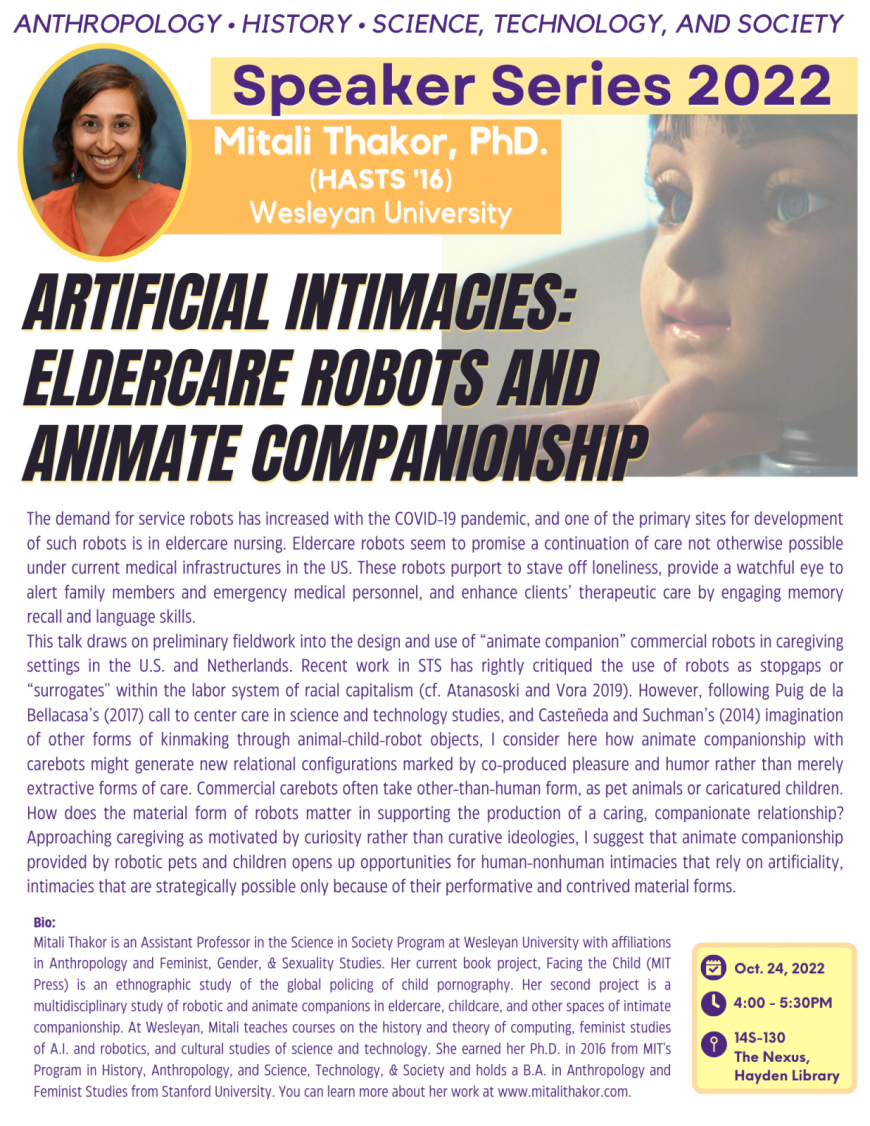Fall 2022 Speaker Series: Mitali Thakor (HASTS '16), Artificial Intimacies: Eldercare Robots and Animate Companionship

Mitali Thakor, PhD. (HASTS '16)
Wesleyan University
October 24, 2022 Monday, October 24, 2022 4:00PM - 5:30PM 14S-130, The Nexus, Hayden Library
Artificial Intimacies: Eldercare Robots and Animate Companionship
Abstract:
The demand for service robots has increased with the COVID-19 pandemic, and one of the primary sites for development of such robots is in eldercare nursing. Eldercare robots seem to promise a continuation of care not otherwise possible under current medical infrastructures in the US. These robots purport to stave off loneliness, provide a watchful eye to alert family members and emergency medical personnel, and enhance clients’ therapeutic care by engaging memory recall and language skills.
This talk draws on preliminary fieldwork into the design and use of “animate companion” commercial robots in caregiving settings in the U.S. and Netherlands. Recent work in STS has rightly critiqued the use of robots as stopgaps or “surrogates'' within the labor system of racial capitalism (cf. Atanasoski and Vora 2019). However, following Puig de la Bellacasa’s (2017) call to center care in science and technology studies, and Casteñeda and Suchman’s (2014) imagination of other forms of kinmaking through animal-child-robot objects, I consider here how animate companionship with carebots might generate new relational configurations marked by co-produced pleasure and humor rather than merely extractive forms of care. Commercial carebots often take other-than-human form, as pet animals or caricatured children. How does the material form of robots matter in supporting the production of a caring, companionate relationship? Approaching caregiving as motivated by curiosity rather than curative ideologies, I suggest that animate companionship provided by robotic pets and children opens up opportunities for human-nonhuman intimacies that rely on artificiality, intimacies that are strategically possible only because of their performative and contrived material forms.
Bio:
Mitali Thakor is an Assistant Professor in the Science in Society Program at Wesleyan University with affiliations in Anthropology and Feminist, Gender, & Sexuality Studies. Her current book project, Facing the Child (MIT Press) is an ethnographic study of the global policing of child pornography. Her second project is a multidisciplinary study of robotic and animate companions in eldercare, childcare, and other spaces of intimate companionship. At Wesleyan, Mitali teaches courses on the history and theory of computing, feminist studies of A.I. and robotics, and cultural studies of science and technology. She earned her Ph.D. in 2016 from MIT's Program in History, Anthropology, and Science, Technology, & Society and holds a B.A. in Anthropology and Feminist Studies from Stanford University. You can learn more about her work at www.mitalithakor.com.
